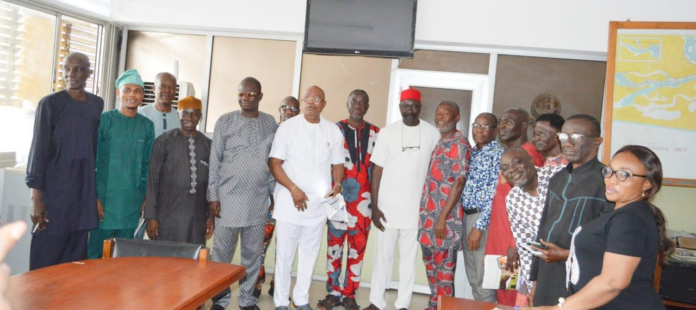
Freight forwarders in the country have picked holes in the cargo clearance chain, pointing out that it is not only inimical to the economy but also a drawback to the sustainable development of the nation.
They averred that while there is no exemption to all the nation’s seaports, they stated that the situation is worse in Nigeria’s premier port, Apapa, Lagos.
Among other ills, they hinged the hiccups in the cargo clearance chain on the insecurity and porosity in the nation’s seaports.
They blamed the situation on the poor management of the Nigerian Ports Authority (NPA), Nigerian Police and the Nigeria Customs Service (NCS) in relation to their roles and responsibilities in the terminals.
The freight forwarders stated this recently at the monthly roundtable of the Maritime Reporters Association of Nigeria (MARAN) in Apapa, Lagos.
They stated this under the auspices of the 100% Compliance Team of the National Association of Government Approved Freight Forwarders (NAGAFF) which has Alhaji Tanko Ibrahim as its Chairman.
Ibrahim was accompanied to the roundtable which took place at MARAN International Press Centre (IPC) by other members of his team including the Chairman of NAGAFF, Western Zone, Mr. Fred Adjuzie.
Giving an insight into the ills that have plagued the cargo clearance chain, Ibrahim observed that Nigeria’s premier port situated in Apapa has become a haven for all manner of persons including touts, beggars, and food vendors as unauthorized persons enter and exit without any scrutiny.
He stated that these anomalies usually take place inside the popular examination platform provided by APM Terminals for licensed clearing agents.
According to him, some miscreants sleep inside the Apapa Port and smoke Indian hemp. They do this to the knowledge of men and officers of NCS, NPA staff and security agents working in the port. We have written letters to the concerned authorities. The NCS, Apapa Command had visited the platform to inspect and confirm our concern but up till now, no action has been taken to address it.
Continuing, Ibrahim said: “We have written a letter to the Nigeria Customs Service through the Customs Area Controller (CAC), Apapa Command and the Tin Can Island Command. If you look at the APM Terminal platform today, the crowd is more or less like a market place. You don’t even know who is who. You would see people sleeping inside the terminal, smoking Indian hemp and other hard drugs. A port is supposed to be a sensitive place. You cannot try this at the airport.
“There was a clearing agent that was traced from APM Terminal by these hoodlums inside the port. They followed him to his area of residence, robbed him and killed him. However, in the process, the identity card of one of the hoodlums dropped and the police traced the owner.
“When the police apprehended the thieves, they confessed that they traced their victim from APM Terminal, Apapa. This means that all of us are not safe. There is need for NPA, Customs and the Police to tighten security inside the port. As a matter of fact, we cannot continue this way. As a freight forwarder or clearing agent, if you don’t have any business to be inside the port, why are you there? So what is the essence of the NPA asking us to sign with them? Is it not for screening of people going into the port? Beggars should not be allowed to come into the port. We must be mindful of our security system because we all know the present security situation in the country today.”
Ibrahim also flayed the recent return of the Standard Organisation of Nigeria (SON) to the port, pointing out that freight forwarders are yet to understand the mode of operation that would be adopted by the government agency in the nation’s seaports.
According to him, SON should not return back to its old ways of picking product samples without returning them as well as blocking of containers in order to collect bribes. These illegal operations would be resisted by the freight forwarders. NAGAFF 100% Compliance Team is not against SON return to the port but the agency should not be another impediment in the cargo clearance chain as it was in the past.
In order to address the present proliferation of adulterated goods in the market, particularly electrical appliances and products, the Chairman enjoined the management of SON to effectively utilize its SONCAP Programme at the port of origin instead of port of destination.










